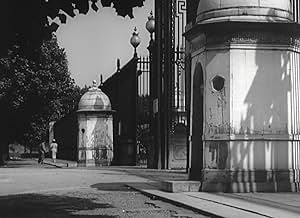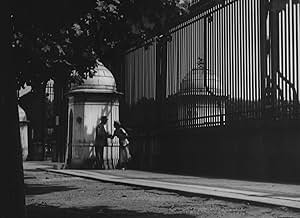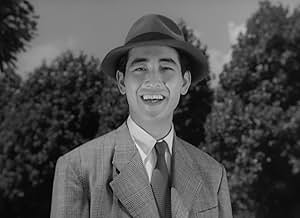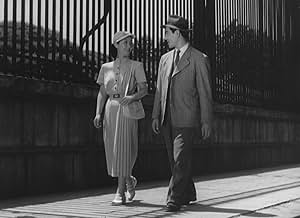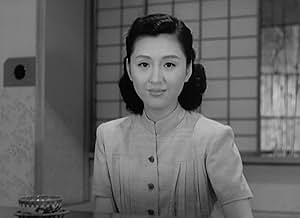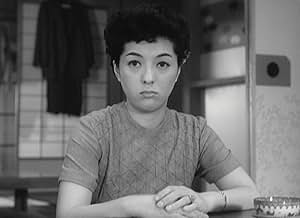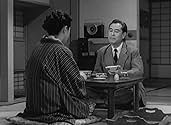IMDb RATING
7.6/10
4.1K
YOUR RATING
A childless middle-aged couple faces a marital crisis.A childless middle-aged couple faces a marital crisis.A childless middle-aged couple faces a marital crisis.
- Awards
- 1 win total
- Director
- Writers
- All cast & crew
- Production, box office & more at IMDbPro
Featured reviews
This is both typical and untypical Ozu - typical in that its a simple story with a typical simple point (but of course told with deceptive skill and complexity), but its unusual in that its set among the upper middle classes, not the 'average' Japanese family of most of his movies.
The story is straightforward - an unhappy marriage between a rich girl and her successful but relatively low born husband. She can't hide her contempt for his dullness and rustic ways. He is unhappy but never argues back, just finds his own little ways of getting pleasure out of life. A series of incidents finds them having an unexpected late night simple meal (green tea over rice is essentially 'leftovers' when nothing else is available) and suddenly she realizes she loves him after all.
As always with Ozu, the richness is in the characters. Taeko, played by Michiyo Kogure is spoiled and insensitive, but a compelling, capricious character. Mokicho (the husband) under his dull salary-man skin is really a sensitive, caring man. The other characters are all vivid and memorable, especially Setsuko, the headstrong niece. There are also wonderful set pieces, usually involving Taekos friends, having little girls nights together, gossiping about their husbands and plotting marriages.
With Ozu a brief overview of his movies always makes him sound dull. But in reality this is funny, moving and compelling. Its not first rate Ozu - the theme of the movie is too straightforward and obvious, the ending a little too neat and tidy. But second rate Ozu is still head and shoulders above almost any other drama. The humanity of the characters shines through, creating a little world we can sink into. The wonder of Ozu is that we are not observing characters, we are sitting with them, in the middle of their lives.
I can't help but compare this to Naruse's 'Repast', another movie about a marriage in trouble, where the wife cannot hide her contempt for her husband, but in the end they both realize why they love each other. Naruse was more of a pessimist, so the reconciliation at the end of Repast is both happy and sad, as the characters realize that that living together, even without a great love, is better than being lonely. In Ozu's more traditional world, the couple (product of an arranged marriage) eventually find love, even after many years of marriage by the acceptance of each others little foibles. Taeko learns that simple things can be as pleasurable as luxury. It seems a little trite, and it would be in another film makers hands, but somehow Ozu finds depths of wisdom even in such clichés.
The irony is that Ozu was a lifelong bachelor, yet he made perhaps the best movies ever made at examining families in detail. If I had my way I'd put this movie and 'Repast' as compulsive viewing for all engaged couples. It would be more effective than any pre-marriage course!
The story is straightforward - an unhappy marriage between a rich girl and her successful but relatively low born husband. She can't hide her contempt for his dullness and rustic ways. He is unhappy but never argues back, just finds his own little ways of getting pleasure out of life. A series of incidents finds them having an unexpected late night simple meal (green tea over rice is essentially 'leftovers' when nothing else is available) and suddenly she realizes she loves him after all.
As always with Ozu, the richness is in the characters. Taeko, played by Michiyo Kogure is spoiled and insensitive, but a compelling, capricious character. Mokicho (the husband) under his dull salary-man skin is really a sensitive, caring man. The other characters are all vivid and memorable, especially Setsuko, the headstrong niece. There are also wonderful set pieces, usually involving Taekos friends, having little girls nights together, gossiping about their husbands and plotting marriages.
With Ozu a brief overview of his movies always makes him sound dull. But in reality this is funny, moving and compelling. Its not first rate Ozu - the theme of the movie is too straightforward and obvious, the ending a little too neat and tidy. But second rate Ozu is still head and shoulders above almost any other drama. The humanity of the characters shines through, creating a little world we can sink into. The wonder of Ozu is that we are not observing characters, we are sitting with them, in the middle of their lives.
I can't help but compare this to Naruse's 'Repast', another movie about a marriage in trouble, where the wife cannot hide her contempt for her husband, but in the end they both realize why they love each other. Naruse was more of a pessimist, so the reconciliation at the end of Repast is both happy and sad, as the characters realize that that living together, even without a great love, is better than being lonely. In Ozu's more traditional world, the couple (product of an arranged marriage) eventually find love, even after many years of marriage by the acceptance of each others little foibles. Taeko learns that simple things can be as pleasurable as luxury. It seems a little trite, and it would be in another film makers hands, but somehow Ozu finds depths of wisdom even in such clichés.
The irony is that Ozu was a lifelong bachelor, yet he made perhaps the best movies ever made at examining families in detail. If I had my way I'd put this movie and 'Repast' as compulsive viewing for all engaged couples. It would be more effective than any pre-marriage course!
"The flavour of green tea over rice" is both a typical Ozu movie and one that defiates from his usual format in some respects.
Typical Ozu is the emphasis on small- and not on big emotions. The story is, as usual. Situated in the post World War II era, and the influence of the United States on the Japanese society is clearly visiblle (baseball match).
In most of the Ozu films the central relations are between children and parents (at the beginning of his career) or between parents and grandparents (later in his career). In "The flavour of green tea over rice" it is a married couple that forms the center of the film. Their marriage was arranged and is not in good shape. You can feel it when the man returns home from his work and the greeting of the two spouses is lukewarm at best.
The woman seems independent and emancipated at first. She has her female friends and she likes going out with them. As the film progresses she becomes however less and less sympathetic. In front of her female friends she expresses herself very disrespectfully about her husband (a dummy), whom we get to know as a person of great integrity. She happens to be of richer descent than her husband and dislikes his "cheap taste" (maybe being a snob herself).
Although differences between genarations do play a lesser role than in most Ozu films, they aren't totally non existent either. Seeing the marriage between her uncle and aunt, a niece of the woman in a subplot vehemtly resists becoming trapped in an arranged marriage herself.
In one of the most beautiful happy ends I have ever seen the two spouses reconcile with each other. When the man arrives at home in the middle of the night from the airport the servants are already in bed. Man and woman together prepare a meal, in so doing discovering how their kitchen works (normally the woman never cooks herself). The act of preparing a meal is capable to bridge the gap that hitherto existed between man and woman, just like the act of eating a (delicious) meal is capable of bridiging tge gap between Protestants and Roman Catholics in "Babette's feast" (1987, Gabriel Axel). The meal in "The flavour of green tea over rice" is however very simple compared with "Babette's feast". It's not the food itself that does the trick, it is all about the small talk during the preparation. Ozu as the master of the small emotions at his very best.
Typical Ozu is the emphasis on small- and not on big emotions. The story is, as usual. Situated in the post World War II era, and the influence of the United States on the Japanese society is clearly visiblle (baseball match).
In most of the Ozu films the central relations are between children and parents (at the beginning of his career) or between parents and grandparents (later in his career). In "The flavour of green tea over rice" it is a married couple that forms the center of the film. Their marriage was arranged and is not in good shape. You can feel it when the man returns home from his work and the greeting of the two spouses is lukewarm at best.
The woman seems independent and emancipated at first. She has her female friends and she likes going out with them. As the film progresses she becomes however less and less sympathetic. In front of her female friends she expresses herself very disrespectfully about her husband (a dummy), whom we get to know as a person of great integrity. She happens to be of richer descent than her husband and dislikes his "cheap taste" (maybe being a snob herself).
Although differences between genarations do play a lesser role than in most Ozu films, they aren't totally non existent either. Seeing the marriage between her uncle and aunt, a niece of the woman in a subplot vehemtly resists becoming trapped in an arranged marriage herself.
In one of the most beautiful happy ends I have ever seen the two spouses reconcile with each other. When the man arrives at home in the middle of the night from the airport the servants are already in bed. Man and woman together prepare a meal, in so doing discovering how their kitchen works (normally the woman never cooks herself). The act of preparing a meal is capable to bridge the gap that hitherto existed between man and woman, just like the act of eating a (delicious) meal is capable of bridiging tge gap between Protestants and Roman Catholics in "Babette's feast" (1987, Gabriel Axel). The meal in "The flavour of green tea over rice" is however very simple compared with "Babette's feast". It's not the food itself that does the trick, it is all about the small talk during the preparation. Ozu as the master of the small emotions at his very best.
This film mines much of the territory of Ozu films, including the complex relationships of the major characters, the resistance of a young lady to agree to an arranged marriage and the aesthetics of everyday living amongst the working classes. The film has two main stories, parallel to each other, running through it: Takeo, who is bored with her husband who is very simple in his needs, lies to him so she can go to a spa with her friends. Their niece, the pretty Setsuko, is the one who is resisting the arranged marriage meeting. How the two stories bisect is typical Ozu, creating conflict and anger. This film is not as good as much of Ozu's output at the time, but that includes "Tokyo Story", "Early Summer" and "Late Spring", which are standout classics. The great Setsuko Hara is not in this film and the equally great Chishu Ryu is a bit player, but I think you'll still find this film worthy of your time. If you haven't seen an Ozu film, start with "Tokyo Story" or "Late Spring" (others too, including "Good Morning" and "Autumn Afternoon") but give this a try. I don't think you will be disappointed.
Michiyo Kogure is discontented with her long marriage to Shin Shiburi. She refers to him as "Mr. Obtuse" to her female relations and friends, and talks them into going on holiday with her, claiming to him that her niece, Keiko Tsushima, is at the resort, suffering from appendicitis; she's probably scared and lonely; and then Miss Tsushima walks in. Miss Tsushima is also a problem. Like many an Ozu woman, she doesn't want to get married yet, and certainly doesn't want an arranged marriage like her aunt. It's so primitive.
It all comes to a head one evening when he's enjoying rice with green tea and his wife doesn't like that way of eating it. He tries to explain that he likes simple, primitive, informal things, like cheap cigarettes and third-class railway tickets and pachinko machines. He understands she likes the 'better' things, and that's fine. And he won't pour tea on his rice any more. Her response is to walk out of the room.
I decided most of the way through that this was Ozu's variation on THE TAMING OF THE SHREW, without any of Petruchio's cruelty.... at least on the part of Mr. Shiburi. The studied cruelty is exhibited, in truth by Miss Kogure. There's not a cruel bone in Shiburi's body. He tries to get his niece to do the right thing simply by talking. He's remembered fondly by a member of his old army squadron as kind; he's sponsoring Kôji Tsuruta for a job at his company because he's the brother of an old high-school friend who got killed in the war. Perhaps Kate is a combination of Miss Kogure and Miss Tsushima.
The transformation of Ozu's style from before the war is almost complete. Gone are the American movie posters, although there's some discussion of a Jean Marais film; and the camera sticks pretty close to the floor, although there is one pull-in at the end of a scene, after the players have left. I'm not sure what that is supposed to mean.
It all comes to a head one evening when he's enjoying rice with green tea and his wife doesn't like that way of eating it. He tries to explain that he likes simple, primitive, informal things, like cheap cigarettes and third-class railway tickets and pachinko machines. He understands she likes the 'better' things, and that's fine. And he won't pour tea on his rice any more. Her response is to walk out of the room.
I decided most of the way through that this was Ozu's variation on THE TAMING OF THE SHREW, without any of Petruchio's cruelty.... at least on the part of Mr. Shiburi. The studied cruelty is exhibited, in truth by Miss Kogure. There's not a cruel bone in Shiburi's body. He tries to get his niece to do the right thing simply by talking. He's remembered fondly by a member of his old army squadron as kind; he's sponsoring Kôji Tsuruta for a job at his company because he's the brother of an old high-school friend who got killed in the war. Perhaps Kate is a combination of Miss Kogure and Miss Tsushima.
The transformation of Ozu's style from before the war is almost complete. Gone are the American movie posters, although there's some discussion of a Jean Marais film; and the camera sticks pretty close to the floor, although there is one pull-in at the end of a scene, after the players have left. I'm not sure what that is supposed to mean.
Japanese master Yasujiro Ozu made this 1952 film between two masterpieces, Early Summer and (especially) Tokyo Story, and this film suffers a bit by comparison with them. As in other (somewhat more accomplished) movies by Ozu (one thinks especially of the superb Late Spring) the plot deals on the issue of whether a young woman should marry, and if that marriage should be a love marriage or arranged one. There is a middle aged, childless couple, the snobbish, nasty Taeko (Michiyo Kogure) and her husband, the honest, good but a bit dull salary man Satake (Shin Saburi). Her nephew, the pretty young Setsuko (Keiko Tsushima) comes to visit, she has to go to an interview for an arranged marriage, but seeing the loveless marriage between Taeko and Satake, and how she mocks him behind his back, is not very interested.
Ozu's best films haven't dated a bit, but this one has somewhat. Moreover, while I don't agree with the generalization that all of Ozu's films are slow (not all of them are), this one is on the leisurely paced side. What's more, the movie takes some time to develop its plot so it does require a bit of patience from the viewer. You will eventually warm up to this movie, I think, but not immediately.
On the plus side, it is a good, interesting movie, with believable, well developed characters. Chishu Ryu, Chikage Awashima and Kumiko Mikaye (all regular of many Ozu films) have bit roles here.
Ozu's best films haven't dated a bit, but this one has somewhat. Moreover, while I don't agree with the generalization that all of Ozu's films are slow (not all of them are), this one is on the leisurely paced side. What's more, the movie takes some time to develop its plot so it does require a bit of patience from the viewer. You will eventually warm up to this movie, I think, but not immediately.
On the plus side, it is a good, interesting movie, with believable, well developed characters. Chishu Ryu, Chikage Awashima and Kumiko Mikaye (all regular of many Ozu films) have bit roles here.
Did you know
- TriviaAt the start of the film, two characters mention going to see a new film with Jean Marais. The film was most likely Orpheus (1950), which was released in Japan in June 1951.
- Quotes
Taeko Satake: Think well before you pick your groom, it's important.
- ConnectionsFeatured in David Bordwell on 'The Flavor of Green Tea Over Rice' (2019)
- SoundtracksLove's Old Sweet Song
Composed by J.L. Molloy (as James Lyman Molloy)
- How long is The Flavor of Green Tea Over Rice?Powered by Alexa
Details
- Runtime
- 1h 56m(116 min)
- Color
- Sound mix
- Aspect ratio
- 1.37 : 1
Contribute to this page
Suggest an edit or add missing content

